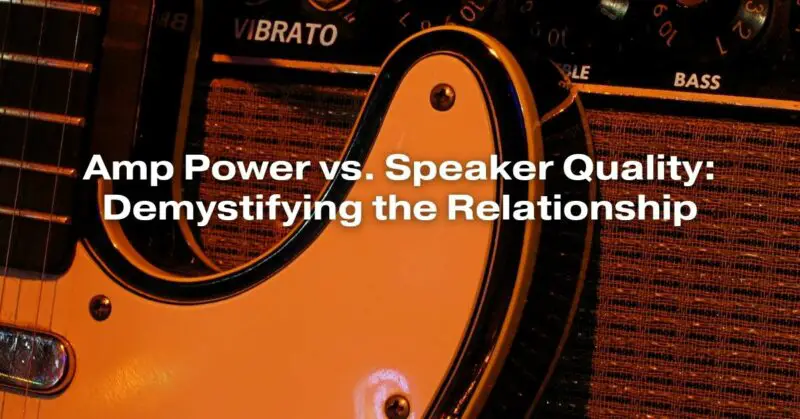When it comes to creating the perfect audio setup, there’s often a heated debate about the significance of amplifier power versus speaker quality. Audiophiles and music enthusiasts alike find themselves caught in the crossfire of this argument, trying to balance budget constraints with the desire for high-quality sound. To unravel this conundrum, it’s essential to understand the intricate relationship between amplifier power and speaker quality.
The Basics: Amplifier Power
Amplifiers serve as the powerhouse of any audio system. They take a weak audio signal and magnify it to a level that can drive speakers effectively. Amplifier power is measured in watts per channel (WPC), indicating how much power the amplifier can deliver to each speaker. The common misconception is that more power equates to better sound quality. While power is crucial, it’s not the sole factor defining audio fidelity.
The Essence of Speaker Quality
On the flip side, speaker quality refers to the design, construction, and materials used in speakers. A high-quality speaker is capable of accurately reproducing sound across various frequencies without distortion. Key components, such as cone material, voice coil, magnet size, and cabinet design, significantly impact a speaker’s performance. A well-designed speaker can make the subtlest nuances of a piece of music come alive, providing a rich and immersive listening experience.
Finding the Balance
The relationship between amplifier power and speaker quality is nuanced. Pairing a high-powered amplifier with low-quality speakers might result in powerful sound, but it can also expose the limitations of the speakers, leading to distortion and poor audio quality. Conversely, connecting high-quality speakers to an underpowered amplifier can result in lackluster sound, as the speakers won’t receive enough power to perform optimally.
Matching Amplifier Power to Speaker Sensitivity
Speaker sensitivity, measured in decibels (dB), indicates how efficiently a speaker converts power into sound. Speakers with higher sensitivity require less power to produce the same volume as speakers with lower sensitivity. When selecting speakers, it’s crucial to consider their sensitivity rating and match it with the appropriate amplifier power. This synergy ensures efficient power usage and optimal sound quality.
Room Acoustics and Speaker Placement
Amplifier power and speaker quality are not the only variables at play. The acoustics of the room and the placement of speakers also significantly affect sound quality. A well-designed room with appropriate acoustic treatments can enhance audio quality, allowing both amplifier power and speaker quality to shine. Additionally, proper speaker placement can create a balanced soundstage and improve the overall listening experience.
Budget Considerations
Budget constraints often dictate the choices audiophiles make. While it’s tempting to splurge on either a high-powered amplifier or top-tier speakers, finding a balance within the budget is key. Investing in moderately powered amplifiers with good speaker quality can offer a satisfying compromise, delivering impressive sound without breaking the bank.
Conclusion: The Perfect Marriage
In the realm of audio systems, the ideal setup is the result of a harmonious marriage between amplifier power and speaker quality. Understanding the synergy between these components, considering speaker sensitivity, room acoustics, and budget constraints, can help audiophiles strike the perfect balance. By demystifying the relationship between amp power and speaker quality, enthusiasts can embark on a journey to create an audio setup that delivers exceptional sound, immersing them in the magic of music like never before.


